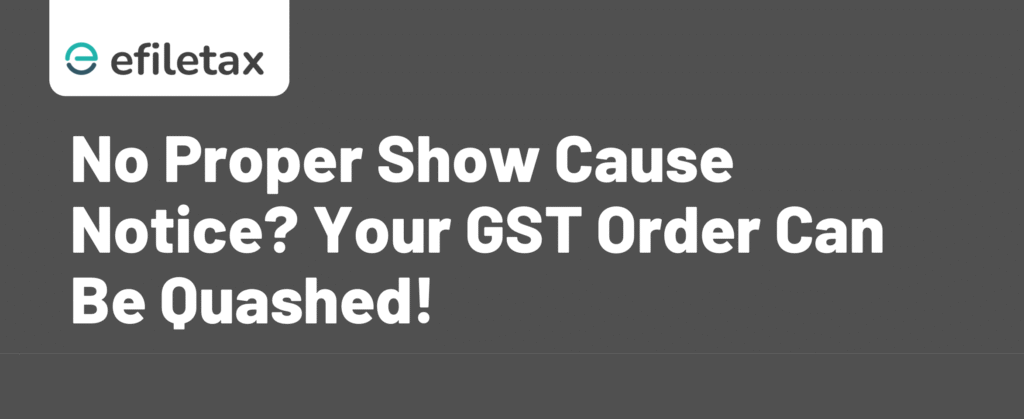
Introduction
Order passed without proper show cause notice violates natural justice and is often quashed by courts. Many taxpayers face sudden GST, income tax or penalty orders without fair hearing. Let’s break this down simply and see what you can do.
When is an Order Invalid Due to Lack of Proper Notice?
Under Indian tax laws, issuing a valid show cause notice (SCN) is mandatory before any adverse order. Key points:
Section 73 & 74 of CGST Act, 2017: SCN must clearly state facts, grounds and provide reasonable time to reply.
Section 124 of Income-tax Act, 1961: For jurisdiction disputes, proper notice is a must.
Orders passed without it can’t stand in law.
Recent Court Rulings
Here are some landmark rulings:
- M/s Canon India Pvt Ltd vs Commissioner of Customs (2021): Supreme Court quashed customs order due to invalid SCN by unauthorized authority.
- Devang Paper Mills Pvt Ltd vs State of Gujarat (2022): Gujarat HC quashed GST demand for lack of opportunity to be heard.
- National Securities Depository Ltd vs SEBI (2022): Bombay HC set aside penalty order passed without proper SCN.
How to Contest an Invalid Order
Follow these practical steps:
Collect Documents: Keep all correspondences and proof that no hearing was provided.
File an Appeal: Use appellate remedies under Section 107 of CGST Act or Section 246A of Income-tax Act.
Writ Petition: If appeal is not effective, approach High Court under Article 226 for quashing.
Consult an Expert: Take help from a tax professional to draft strong grounds.
Expert Tip
👉 Never ignore a defective notice. Even if it seems invalid, respond with objections. This strengthens your case later if you need to challenge the final order.
Sample Comparison Table
| Aspect | Valid Show Cause Notice | Invalid or No Notice |
|---|---|---|
| Authority | Issued by proper officer only | Often issued by wrong or unauthorized |
| Content | Clear facts, grounds, time to reply | Vague or missing details |
| Opportunity to be heard | Mandatory | Denied or rushed |
| Legal standing | Order stands if due process followed | Order liable to be quashed by courts |
Related Legal Reference
FAQs
Q1. Is a verbal notice valid?
No. Notice must be written, with clear grounds.
Q2. Can I get a stay on recovery?
Yes. Courts often grant stay if principles of natural justice are violated.
Q3. How much time do I have to file an appeal?
Within 3 months (90 days) from the date of order under GST.
Summary
Any order passed without proper show cause notice and without hearing violates natural justice and is legally untenable. Taxpayers should appeal or file writs to quash such orders. Always preserve evidence to contest them effectively.
Closing
Facing a defective order? Efiletax can help you draft appeals, file writs and protect your rights. Connect with our experts today for hassle-free tax compliance.